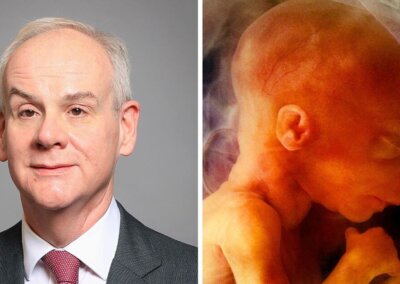Lord Moylan’s Complications from Abortions (Annual Report) Bill passed its Second Reading in the House of Lords this morning.
The Bill passed Second Reading without a division, as is the convention in the Lords, and will now proceed onto Committee Stage.
The Bill proposes a change to the law that would require the Department of Health and Social Care to publish an annual report on medical complications from abortions.
This annual report would include more comprehensive reporting of abortion complications, along the lines of what was published in a Department of Health and Social Care review released in November 2023.
This Government review, which was described as a “one-time analysis”, revealed that abortion complication rates are likely much higher than has been previously reported in the annual abortion statistics, which are based on reporting from abortion providers.
The change to the law would require a similar report to be published each year. The annual report would be required to include data from Hospital Episode Statistics (HES), which are not currently published in the annual abortion statistics complication data reporting.
The Bill will now proceed to Committee Stage.
Peers line up to support Bill
During the debate Lord Moylan explained that a report last year from the Office for Health Improvement & Disparities found the abortion complication rate was “between 3.5 and 4.4 per thousand in the period 2017 to 2021, depending on the year, somewhat higher than ANS data alone and I understand statistically significant. However, this rose significantly, to about 17, 18 or 19 per thousand if incomplete abortions [with] further complications are included”.
This is because the current system for collating abortion complications does not typically capture data after discharge. “Currently about 85% of abortions are medically induced, that is, by taking a sequence of pills”.
“This shows that the abortion landscape is shifting quite rapidly and clinicians need to have available the most robust data about complications”.
Lord Frost supported the Bill, saying “I find it hard to see personally why we would not want as much information as we could possibly get on this question” since there is “clear evidence for at least a potential anomaly that needs addressing in the statistics. And it’s surely in the interests of any woman considering an abortion to have the best possible information about the possible risks involved”.
Speaking in support of the Bill, Baroness Lawlor explained that she had recently had a “hand procedure for Dupuytren’s disease. In the run-up to the procedure, I wanted to know all the evidence that was available about the condition itself, the treatment, the options, the after-care, and indeed the complications”. She described Lord Moylan’s Bill as a “simple measure” that “will provide a fuller picture for people like myself. But more important, it will strengthen the channels of information for the complications arising from abortion”.
David Cahill, Emeritus Professor of Reproductive Medicine, University of Bristol said “As a gynaecologist who worked in the NHS in this country from 1990 until I retired in 2018, I consider that this Bill is an important step forward in collecting accurate data on the complications of termination of pregnancy. The Bill would enable services that support and provide medical care to have clarity about what is required of them. I support the Bill for the sake of improving accuracy and to assist budgeting and appropriate care.”
Government review shows abortion complication rates likely much higher than being reported by abortion providers
The review that Lord Moylan referenced in his speech was published in November 2023 and undertaken by the Office for Health Improvement and Disparities (OHID). It analysed Hospital Episode Statistics (HES) for England from the years 2017 to 2021. It compared the complication rate derived from this analysis to the currently reported complications rate derived from the Abortion Notification System (ANS) that relies on data provided by abortion providers, and which is reported in the annual abortion statistics.
The review found the ANS-derived data shows an average complication rate over the 5 years from 2017-2021 of 1.52 per 1,000 abortions whereas their analysis of HES data over the same period showed a complication rate of 4.06, over 2.6 times higher than the ANS data that is reported in the annual abortion statistics.
When their HES data analysis also included incomplete abortions, the complication rate over the same period was 18.16, which is over 11.9 times higher than the ANS-derived complication rate that does not include incomplete abortions.
An incomplete abortion occurs when some of the unborn baby or pregnancy tissue is left inside the womb of the mother after an abortion. The Department of Health and Social Care states that “incomplete abortions are usually characterised by complications such as bleeding and abdominal pain”. The omission of incomplete abortions from current reporting therefore means the complication rate resulting from abortions is being underestimated at the moment.
The difference in reported complications rate was much higher for women under 20 than for the general population. For women under 20, the HES-derived complication rate was 4.43 times higher than the ANS-derived complication rate, compared to 2.67 times higher for the general population. When the HES data analysis also included incomplete abortion, for under 20s the HES-derived complication rate was 17.43 times higher than the ANS-derived complication rate, compared to 11.95 times for the general population.
The review also identified that abortion providers were not recording complications that happened after discharge or after the form that they were recorded on was sent to the Department of Health and Social Care (DHSC). The OHID noted that there was “no evidence” when the review was undertaken in 2022 that abortion providers were informing the (DHSC) to ensure the data was updated when a woman informed the abortion provider about a complication that occurred after the form had been sent.
The review also noted that complications may be less likely to be recorded for terminations where either both or one of the abortion medications is administered at home, because it is unlikely that the person filling in the HSA4 form will know if the woman experienced a complication following an abortion. Kevin Duffy, public health consultant and former Global Director of Clinics Development at Marie Stopes International (now MSI Reproductive Choices), said“Current reporting concerning complications from abortions is woefully inadequate and fails women. If the government chooses not to require the annual reporting of abortion complications using data from Hospital Episode Statistics, it would then be responsible for the deliberate under-reporting of more than ten thousand cases of post-abortion treatment provided by our NHS hospitals each year.
“The November 2023 report on which Lord Moylan’s Bill is based was a step in the right direction. However, even this report does not include ‘incomplete abortions without complications’ (ICD-10 code O044); these are cases in which parts of the fetus and/or placenta remain inside the mother and, even though there are no indications of infection or haemorrhage, these cases routinely require treatment. FOI requests have shown there are 1.4 times more complications of this kind than all the other types included in the 2023 report combined”.
Spokesperson for Right To Life UK, Catherine Robinson, said “This Bill is a much-needed step forward in improving transparency around abortion complications. It proposes a common-sense change to policy that MPs and Peers, regardless of where they stand on the issue of abortion, should support”.
“A Government review published last year revealed that abortion complication rates are likely much higher than has been previously reported in the annual abortion statistics, which are based on reporting from abortion providers”.
“The new Government needs to urgently introduce measures to ensure that abortion complications data is accurately collected and reliably reported on”.












